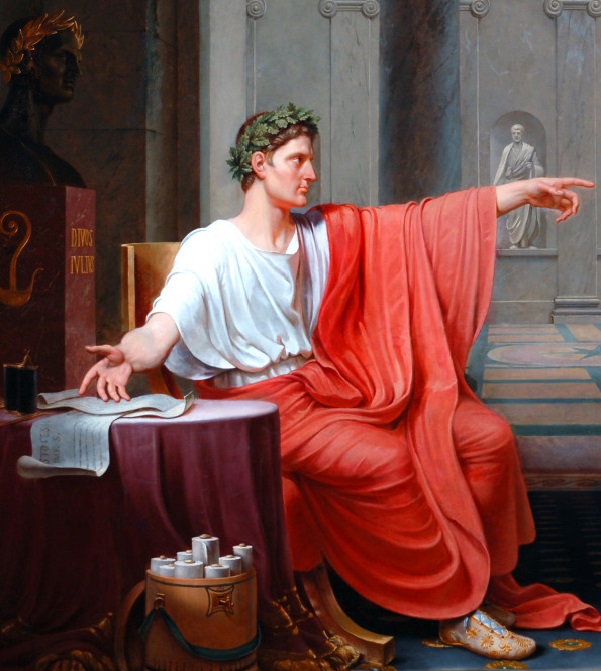~ This is the first of a six-post series called Star Wars and History. (See below for the six posts’ titles.) ~
In Revenge of the Sith, the evil Palpatine transforms the Galactic Republic from the top, creating the Empire — without overthrowing the state. Palpatine is already Chancellor of the Republic, though he’s held office longer than normal, thanks to a civil war. He simply switches his title to Emperor. He also centralizes power in his own hands, at the expense of the elected Senate. But he leaves the Senate in place, along with the rest of the republican government.
Augustus Caesar’s Triumph
The story parallels the transition from Roman Republic to Empire in 27 BC. Like Palpatine, Augustus Caesar had just won a civil war (against Marc Antony and Cleopatra), leaving him in command of the state. Also like Palpatine, Rome’s first emperor didn’t simply throw away the republican government and declare a new monarchy. Augustus preserved the Republic’s institutions, including the Senate and the Roman consuls and other officers. He just took away most of their power.
Revolution from the Top
In fact, Augustus didn’t even declare himself emperor. His key position was Princeps, an old republican title for the most honored senator. People did call him imperator, but back then the Latin word for “emperor” was more an honorific than a title. It meant something like victorious commander. Imperator wouldn’t clearly refer to a king-like ruler until generations later. In fact, Augustus and the other early emperors looked more like banana republic dictators than kings (as I point out in The Jericho River).
Augustus’ revolution from the top, then, was more subtle than Palpatine’s, who actually declares a new “first Galactic Empire.” But like Palpatine, Augustus ruled; no one doubted that.
The Happy Death of Roman “Democracy”
History turns to urban myth, however, if we imagine Augustus snuffing out democracy, like Palpatine. The Roman Republic was more an aristocratic oligarchy than a democracy by Augustus’ time. And the switch to an emperor ended decades of brutal rule by the aristocrats, as well as repeated civil war. It brought the common people greater peace and security. (For more on Augustus, see World History Encyclopedia.)
~~~~~~~~~~~~~~~~~~~~~~
If you like fantasy + history, you’ll love my book, The Jericho River!
Below are the six posts in this series, Star Wars and History:
1. Roman Republic and Empire (above)
2. Fall of the Knights Templar
3. Joseph Campbell and the Urban Myth with a Thousand Faces
4. Father vs. Son in Myth
5. Divine Conception in Myth
6. Samurai and Nazis
See also, Why Sounds Yoda So Archaic?
Image: Etienne-Jean Delécluze, The Emperor Augustus Rebuking Cornelius Cinna for His Treachery, 1814, cropped (including to remove Cinna) — provided through VanGoYourself
© 2016, 2017, 2018 by David W. Tollen. All rights reserved.


0 Comments
Trackbacks/Pingbacks